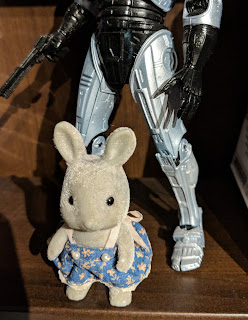Foreigner
Foreigner
C. J. Cherryh, 1994
I enjoy thinking about the link between language and cognition, and this work manages to delve into this subject on a deeper level than the back-of-the-book-copy would have you believe. "...one human's fondness for a species which has fourteen words for betrayal and not a single word for love?" I'm glad I didn't actually read that before picking up the book. In fact, Foreigner does a nice job not playing into that "Eskimos have x number of words for snow" silliness, instead subtly exploring the fundamental differences between two sentient races, reflected in their language.
The aliens, called atevi, aren't less moral, or less
good, or less or more anything than humans, but they are irrevocably
different. It's actually refreshing for a sci-fi piece not to go with
the easy out of 'we are all the same at the core'. It's a completely separate sentient
species, developed on a different world, and all bets are off.
Foreigner is also a nice exploration of a diplomatic
(non-action-guy!) protagonist, who does his best to sympathize and
understand the atevi, but has to always watch his human instincts, and
always has to think of his own people. In the most moving passages,
Bren constantly realizes anew he can't really understand or be understood by even
his closest atevi companions. It's almost like playing ambassador to
dolphins or gorillas, once you fall back from communicating on
their terms and ascribe human motivations to their behavior, you'll
never really understand what's going on. And even if you don't, maybe you actually can't understand.
Okay, so that's all well and good, but the first thing that struck me about this book was the beginning.
Foreigner is divided into three
books.
Book one is pages 9-23, book two is 27-61, and book three pages
65-423.
You don't meet the main protagonist until book three.
The first two sections set up the situation of the humans on this
world. The first is how the ship ends up in that system, the second
the first contact between the species. Not knowing what I was getting
into, I was a bit surprised when, 20 pgs in, getting intrigued by the
characters, the storyline jumped several generations. I was growing
very interested in the second story, when again, 200 years skipped
ahead. I didn't fully trust that Cherryh was going to stay put in her
final time until a few chapters had gone by.
So, my opinion is
complicated here. Showing the story this way saves Cherryh from many
awkward exposition possibilities, the dreaded "he remembered when he
had learned how humans landed..." style info-dump, the interaction
with a supernumerary whose purpose is to be explained to, or many other
cringe-worthy strategies. I know it's often a struggle for science fiction and
fantasy authors to present their world with style.
I'm conflicted
about this approach. It certainly gave me as a reader a clearer and more
personal feel for the history which backs up the main story to see it
through the people who were there. Also there's some opportunity for subtle humor with later characters misunderstanding the same
events. However, I did feel slightly disappointed once it became clear
that I would never get the full story about the protagonists in Part 1
or 2. (Of course, at this point, she's written a ton of books in this
series, maybe some of them fill in the gaps.) I'm not
categorically stating I need every detail of every character for a book
to be good, just that in this case it was jarring to be flung forward
in the timeline. So, is the bait and switch justified in the name of
clearer exposition? I'm undecided.
4 Stars - A Really Good Book



Comments
Post a Comment
FYI: Most comments are moderated, and will not appear immediately.